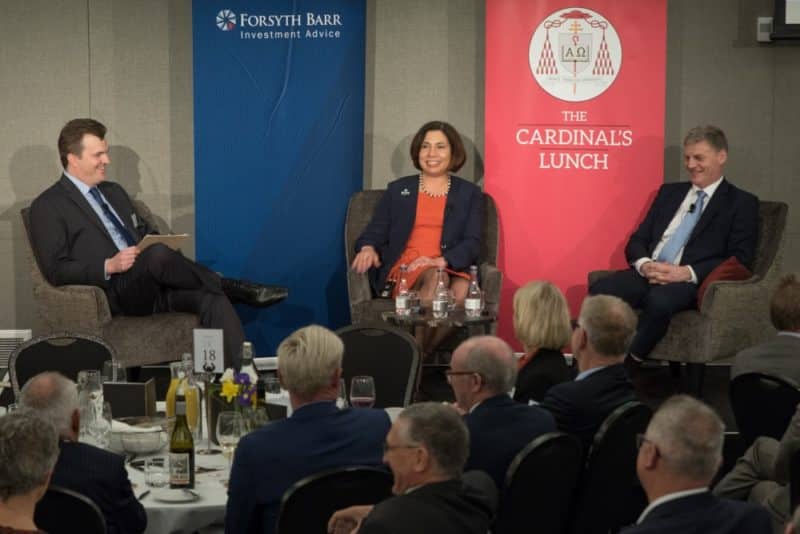by NZCBC COMMUNICATIONS
Those who attended the inaugural Wellington Archdiocese Cardinal’s Lunch held in early August received food for the soul, not just the body, during what was an insightful and inspirational conversation with guests Sir William English and Lady Mary English. On August 8, more than 200 people attended the lunch, held in the Intercontinental Hotel, Wellington.
Sir William and Lady Mary shared their views and thoughts on faith, family and professional life with those at the soldout event.
New Zealand Catholic Bishops Conference executive officer James van Schie led the discussion with the recent “first couple”. The couple reflected on their lives during Sir William’s time in politics and Lady Mary’s work in medicine, together with raising a family, living their faith and contributing to the community.
Both were educated in Wellington and were head prefects at their respective schools — Sir William, a St Patrick’s Silverstream old boy and Lady Mary, an alumnus of St Catherine’s, Kilbirnie.
Lady Mary acknowledged the encouragement she received, in particular, from a Sister of Mercy, supported by the school, in realising her vision of becoming a doctor.
She recalled when, as a 12-year-old girl, she saw how doctors cared for her mother when she [her mother] was in hospital, and thinking at that moment that this is something she wanted to do.
The couple met at the University of Otago where they were both members of the Catholic Society. Sir William recalled his future wife as being very kind to him, while her impression of her future husband was of someone who was very grounded and humble.
When asked to reflect on someone they had known in their lives who embodied Pope Francis’ call to holiness, in his recent writing Gaudete Et Exsultate, Lady Mary shared some personal stories, including one of a friend “who taught me the unconditional love of a mother, in that when she is in a park in Wellington in the freezing cold because her severely
autistic son cannot be at home because he just eats everything in the fridge and he can’t stop eating from the fridge so she has to get him out, away from the fridge and get some exercise”. She talked also of a student priest “who taught me about St Ignatius of Loyola’s strategy of going towards things that bring you consolation and moving away from things that bring you desolation”.
Sir William said that “One of the privileges of public life in New Zealand . . . is that you spend years listening to endless tales of quiet heroism. There are those whose lives are full of bad luck and suffering and how they deal with it . . . and being impressed by their quiet peacefulness. The other sort of quiet hero are the people who make things happen . . . I have found there is no group of people where there isn’t someone who can imagine things being better and has the skills to make something work”.
Taking inspiration from the Bible, Lady Mary said Luke’s Gospel resonated with her, reinforcing the fact that everyone is welcomed by God, regardless.
She said she was reminded of this daily in her work with people from all walks of life.
The message of hope was a strong theme in the conversation with the couple. In their faith and in their advice to the young, Lady Mary referred again to an Ignatian spirituality that is the embodiment of hope, while Sir William talked about the Beatitudes, and referred to these as “the most brilliant 150 words — I used to read it for political technique”.
On a note of optimism, he went on to say that “things (for young people) have never been better”, and added “don’t let people complaining get in the way. If we are busy complaining, we’re not solving problems”.
School leaders at St Patrick’s and St Catherine’s asked the couple what influence their Catholic education had had in their later lives.
Sir William said, for him, it had had a profound effect and had provided an anchor. “If you’re in public life and you get lost, you become pretty ineffective and hopeless if you don’t know where to go back to. My Catholic Faith has been important in getting over mistakes and having a few principles where the Church and people around you remind
you of what you’re meant to be believing in.”
Lady Mary said for her it was the witness of the faith of women religious — “that faithfulness touched me enormously.
Subsequently, in my faith is the belief that every human being has intrinsic value, and it’s not conditional on anything”.
They were also asked that, as a doctor and longstanding Member of Parliament, what advice they’d give to young people who are in the early stages of perusing these careers?
Sir William said, “You find out what you’re passionate about by going out and doing things . . . feel relaxed about your own self-expression. Don’t let the system’s boundaries define you . . . . be irrationally optimistic, don’t lose that sense of hope.”
Lady Mary recommended being “very clear about what brings you joy in your life, find like-minded people” and “know your history . . . so you can stand in a position of strength, not weakness”.
This event is the first of many new initiatives coming out of the 2017 Wellington Archdiocesan Synod. Hosted by Cardinal John Dew, the lunchtime forums will also provide networking opportunities for practising and retired professionals to connect with Church leadership and to hear from dynamic speakers, including local, national and international leaders.
Cardinal John Dew said: “I see these events as a chance to welcome people from all walks of life and backgrounds to engage in their faith journey and to encourage one another to extend their Catholic values within the workplace.”

Reader Interactions